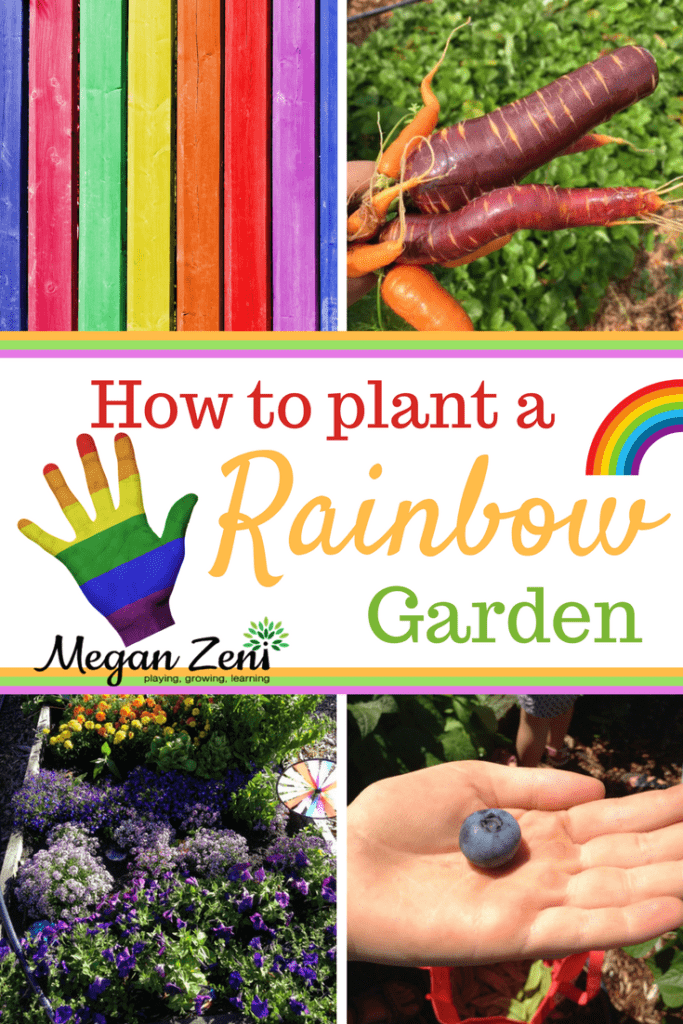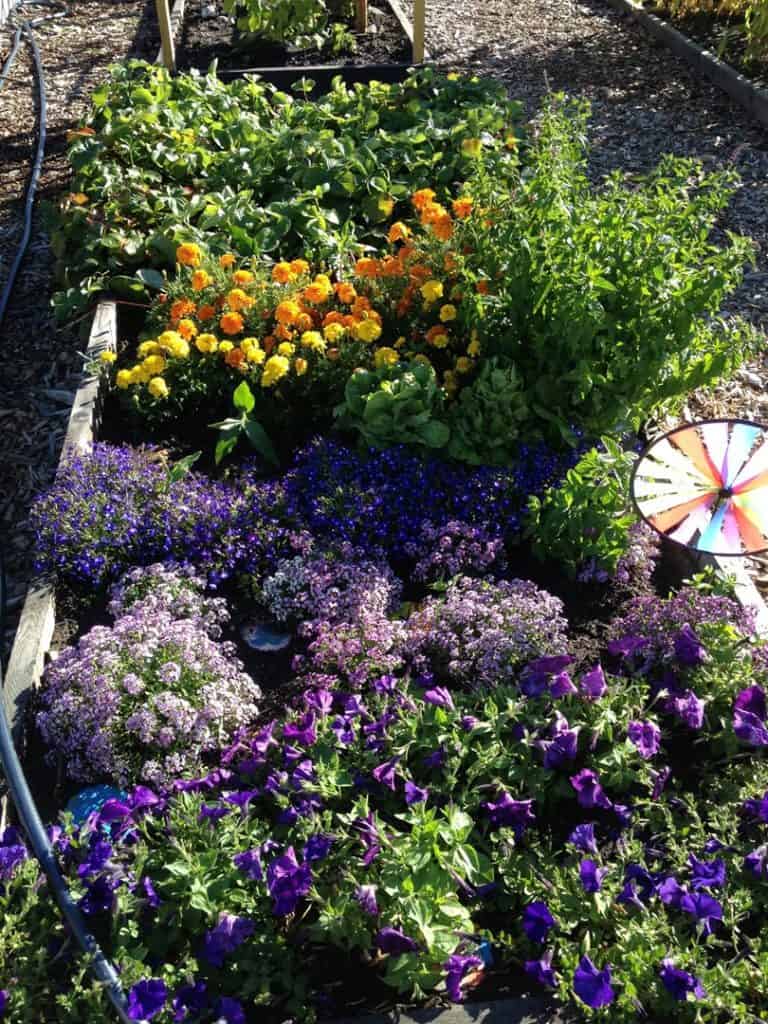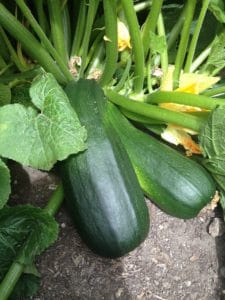- filed under: Outdoor Classroom Set Up, School Garden Basics
How to Plant a Rainbow Garden with Kids

Planting with a theme in mind is a fun and engaging way to begin any garden project with kids. Over the years, I’ve planted several themed garden beds that range in complexity from adding a few dinosaurs to the kale, to a fully developed fairy garden. If you are looking for a visually exciting garden project to complete with children, then a Rainbow Garden is a great choice! When planting a rainbow garden with children, give thought to the sensorial benefits of plantings that have a variety of textures, shapes and fragrances.
How to Plant A Rainbow Garden
To begin, you need to select an area with some length, preferably with full sun exposure. If you can create an arched bed, even better!
It is helpful if you have room for mass plantings to really give each colour the emphasis it needs for the overall rainbow effect. If you find you are short on space, it also looks nice when pots are added to the garden area to add height, depth, and the illusion of an arch, to your rainbow garden.
Once you have a garden space in mind, you can begin to choose plantings that are suitable for the sun exposure, soil conditions, and climate of your rainbow garden. You’ll also have to decide if you want your rainbow garden to be a perennial or annual garden bed, or a mix of both!
Literacy Links
Don’t forget to extend your garden learning with these rainbow garden themed books:
Planting A Rainbow by Lois Ehlert
The Edible Rainbow Garden by Rosalind Creasy
I Can Eat A Rainbow by Annabel Karmel
End Of The Rainbow Fruit Salad by Eluka Moore
amzn_assoc_placement = “adunit0”;
amzn_assoc_search_bar = “true”;
amzn_assoc_tracking_id = “roomtoplay07-20”;
amzn_assoc_ad_mode = “manual”;
amzn_assoc_ad_type = “smart”;
amzn_assoc_marketplace = “amazon”;
amzn_assoc_region = “US”;
amzn_assoc_title = “My Amazon Picks”;
amzn_assoc_linkid = “208aee00a299b126d1dbf3e48e4ef2a0”;
amzn_assoc_asins = “015204633X,9625932992,075665162X,0989029506”;
ROY G BIV Plant Choices
Choosing plantings that match the spectrum of rainbow colours can be as simple or complex as you’d like! If you’d like to mix a variety of plant species that are under one colour, go for it! Some of the most beautiful rainbow gardens mix plant species with annual and perennial selections to extend the garden’s beauty.
Remember to plant the taller plants that may require staking, or will cast shade, at the back of the bed. There are some species of flowering plants that produce a similar plant in a spectrum of colours, like roses, snapdragons, poppies and tulips, which makes for a nice rainbow inspired mass planting.
Great Plant Choices for the West Coast Climate
Here are some examples of specific flowering plant choices that grow well in our west coast climate and are suitable for gardens with children. Like all gardens, children must be supervised and taught to not eat garden produce or blooms without checking with an adult first.
Red Plants: geranium, tulip, rose, poppy, petunia
Orange Plants: marigold, strawflower, poppy, chrysanthemum
Yellow Plants: marigolds, daffodils, sunflowers, rudbeckia
Green Plants: ornamental grasses, kale, lamb’s ear, rosemary
Blue Plants: lupine, columbine, cornflower, lobelia,
Indigo Plants: salvia, larkspur, violas, snapdragon
Violet Plants: aster, purple coneflower, lavender

An Edible Rainbow Garden

Another excellent choice is to plant an edible rainbow garden that ties into the rainbow of healthy fruit and veggie choices that children should be enjoying daily.
Most edible crops will not ripen at the same time, which you may want to use to your strategic advantage by planting crops that will be ready to harvest in succession. You could also plan for mass plantings of colour by selecting multiple varieties of crops in a particular colour. It is also fun and easy to mix edible plants with ornamental flowers for a full rainbow garden experience!
Edible Red Plants: strawberries, radishes, beets, red peppers, raspberries, tomatoes
Edible Orange Plants: cherry tomatoes, pumpkins, carrots, orange peppers
Edible Yellow Plants: yellow cherry tomatoes, corn, spaghetti squash, pattypans
Edible Green Plants: beans, cucumbers, kale, zucchini, lettuce greens, mint, rosemary
Edible Blue Plants: blueberries, blue corn
Edible Indigo Plants: grapes, purple cabbage, elderberries, purple potatoes
Edible Violet Plants: eggplant, blackberries, black currents, purple carrots
Rainbow Garden Crafts & Activities
Adding water-resistant rainbow inspired crafts to the garden bed adds visual interest, and inspires children to feel ownership over the space they have co-created. Here are a few ideas I’ve enjoyed from fellow bloggers:
Rainbow Rainy Day Art by Rhythms of Play
Painted Stone Rainbow Craft by Non Toy Gifts
Rainbow Scavenger Hunt by Creative Family Fun
Rainbow Garden Experiments
Rainbows offer a multitude of ways to engage in learning! From simply learning to identify and name colours, to understanding the spectrum of light, here are some wonderful experiments you might want to try!
Make and Paint a Rainbow by Kids Steam Lab
Rainbow Science: Creating Light Patterns With a CD by Buggy and Buddy
Free Eat A Rainbow Montessori Printables by Living Montessori Now
Learn More
Want to learn more about gardening with kids? Read my related posts on How To Build A Fairy Garden In 3 Easy Steps, and how to grow peas, garlic, kale and more! And follow me on Pinterest for more gardening with kids ideas and inspiration:
